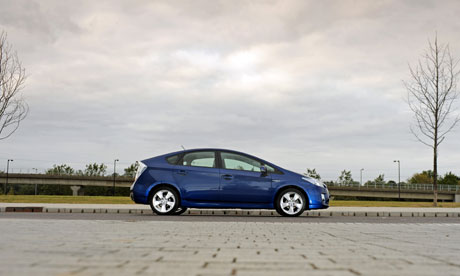
The Telegraph's front page reports today that drivers are being "punished for going green". The story seems to be generating a bit of traction, so it's worth asking whether the claim is actually true.
First, a bit of background. Until a few years ago, road tax – or vehicle excise duty (VED) – was based on engine size. Sensibly, the system was changed in 2005 to tie the banding to CO2 emissions – a much better measure of pollution than engine size. The rules were revised in 2009 to introduce more bands.
The system is designed to incentivise people to choose more fuel-efficient cars. Today, a tax disc ranges from free for the greenest vehicles to £475 for the most prolifgate gas guzzlers. People buying new inefficient cars also face a one-off levy for the first year. This is sensible because the people who buy new vehicles ultimately determine which cars are on the road, even though most vehicle purchases are for secondhand models.
The core of the Telegraph story is that "government officials have begun private discussions with the motoring industry and drivers' groups about an overhaul of the VED rules." The overhaul is expected to see bands tighten up, raising the prospect – according to a Labour source – of a "stealth tax" against those who bought greener cars and may now have to pay more for a tax disc.
For a start, this isn't exactly surprising news. This year's budget included a specific promise to considering overhauling the system:
The Government will consider whether to reform VED over the medium term to ensure that all motorists continue to make a fair contribution to the sustainability of the public finances, and to reflect continuing improvements in vehicle fuel efficiency.
And things haven't exactly moved on very far since then. A spokesman for the Treasury said the current conversations were informal and exploratory: "The Budget pledged to seek the views of motoring groups on Vehicle Excise Duty. There are no proposals on the table and we will be listening to motoring groups."
More fundamentally, though, this is surely an example of a green tax working, not being broken. The Office for Budgetary Responsibility predicts (see p.610) that income from VED will remain almost perfectly flat – at £5.8 billion – over the next five years. Assuming the same number of cars will remain on the road, it follows then that the average bill will remain the same. So if any future changes "will lead to higher tax rates on some motorists", as the story suggests, the corollary is that others will pay less. And if the bands need revising, that must be because people are buying greener cars, the technology is moving on and the bar will gradually need to rise to reflect that.
One question the story does usefully raise is whether VED would be better levied at the point of purchase rather than annually. That's quite an interesting idea because – as Tim Leunig of the Centre Forum argues – it would massively increase the likelihood of people making greener choices. It would also, in the longer term, remove the incentive to scrap inefficient cars rather than keep them on the road, as the tax would already have been paid a decade or so ago, but I doubt that would do much to dint the benefits overall. The challenge would be a political one. If tax income was to stay the same but VED paid entirely up-front, it might be necessary to add many thousands of pounds to the price tag of the least efficient cars. That sounds entirely sensible to me, but sadly I can't see the Tories going for it. Or the Telegraph.

